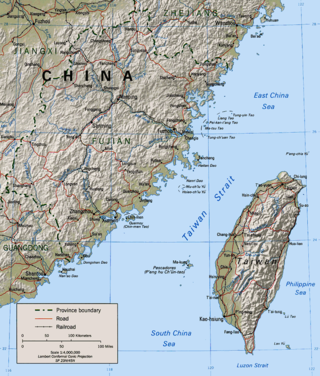Related Research Articles

Terry Gou is a Taiwanese billionaire businessman and politician. Gou is the founder and former chairman and chief executive officer of Foxconn, the world's largest contract manufacturer of electronics. Founded in 1974, Foxconn grew to become an international business empire, becoming the largest private employer and exporter in mainland China with a workforce of 1.2 million. As of 2022, Gou had a net worth of US$6.8 billion.

Taiwanese Mandarin, Guoyu and colloquially as Huayu refers to Mandarin Chinese spoken in Taiwan. A large majority of the Taiwanese population is fluent in Mandarin, though many also speak a variety of Min Chinese known as Taiwanese Hokkien, commonly called Minnanyu, Southern Min, or Hokkien. This language has had a significant influence on Mandarin as spoken on the island.
Wasei-kango are those words in the Japanese language composed of Chinese morphemes but invented in Japan rather than borrowed from China. Such terms are generally written using kanji and read according to the on'yomi pronunciations of the characters. While many words belong to the shared Sino-Japanese vocabulary, some kango do not exist in Chinese while others have a substantially different meaning from Chinese; however some words have been borrowed back to Chinese.

Wei Li-an, known professionally as WeiBird, is a Taiwanese Mandopop and folk-rock singer-songwriter. He has released six studio albums, one live album and two EPs. Wei won the Golden Melody Award for Best New Singer in 2011 and Best Composer in 2015.
The Taiwan consensus is a Taiwanese political term, which was coined in August 2011 by Democratic Progressive Party (DPP) chair Tsai Ing-wen, and is intended to replace the "1992 consensus", which was the basis of DPP's negotiations between Taiwan and the mainland China until now.

Li Hsing or Lee Hsing (李行) is a Taiwanese film director. He was born Lee Tz-da (李子達) in 1930 in Shanghai and died in 2021. He made one of the early popular Taiwanese films in the late 1959, Wang and Liu Tour Taiwan (王哥柳哥遊台灣), though he did not speak Taiwanese. He was also the key director in the promotion of Healthy Realist film (健康寫實片) and Literary Romantic film (愛情文藝片). He was awarded the best director at Golden Horse Awards three times and had seven films awarded the best feature film: Beautiful Duckling, The Road, Execution in Autumn, Land of the Undaunted,, He Never Gives Up, The Story of a Small Town, and Good Morning, Taipei. After he made his last film The Heroic Pioneers, he vowed to be the lifetime volunteer for the promotion of development of Taiwan cinema. In 2009 he established the Cross-Strait Films Exchange Committee, which has been the main, if not only, organization promoting the interaction and cooperation of Taiwanese and Chinese filmmakers. Lee Hsing is often referred to as the “godfather of Taiwan cinema” for his great contribution to Taiwan cinema.

The Apostolic Nunciature to China is the diplomatic mission of the Holy See to the Republic of China. The Republic of China is now more commonly referred to as “Taiwan”. However, as far as the Vatican is concerned, the Republic of China is the state of “China”. The Holy See does not have a diplomatic mission in, or diplomatic relations with, the People's Republic of China (PRC). The Apostolic Nunciature to China is located at 7–1, Lane 265, Heping East Road Section 2, Da'an District, Taipei.
Takao Iwami was a Japanese political pundit and journalist.
Taiwanese Society of Child and Adolescent Psychiatry is a Taiwan-based union of child and adolescent psychiatrists founded in November 7, 1998 with the mission to promote the healthy development of children, adolescents, and families through advocacy, education, and research, and to assist members to meet the professional requirements of child and adolescent psychiatrists throughout their careers.

The Yunlin County Tuku Junior High School is a junior high school located in Tuku, Yunlin, Taiwan, which has two kinds of special classes - Chinese music class and PE class.
Cornelius C. Kubler is an academic in the disciplines of Chinese Linguistics and Chinese Language Pedagogy, an expert in Chinese dialects, and a polyglot who speaks twelve languages including English, German, Mandarin, Taiwanese, Cantonese and Japanese. He is the Stanfield Professor of Asian Studies at Williams College, former American Co-Director of the Johns Hopkins University-Nanjing University Center for Chinese and American Studies in Nanjing, China, and a former American diplomat.

Kolas Yotaka, Han name Yeh Kuan-lin, is an Amis Taiwanese politician and journalist. Since 2020, she has served as spokesperson for the Office of the President under Tsai Ing-wen. Kolas previously served as spokesperson for the Executive Yuan in 2018, the first Taiwanese aboriginal to hold the position.

Gingle Wang is a Taiwanese actress and writer. Gingle began her acting career in 2017 in the film All Because of Love. Her breakthrough came in 2019 with the psychological horror film Detention, where her performance won Best Actress at the 22nd Taipei Film Awards and a nomination for Best Leading Actress at the 56th Golden Horse Awards. She has been described by the Bazaar Magazine as a rising star amongst the new generation of Taiwanese actresses.

The Fujian–Taiwan relations, also known as the Min–Tai relations, refers to the relationship between Fujian, which is located in mainland China, and Taiwan, which is across the Taiwan Strait. Since the average width of the Taiwan Strait is 180 kilometers, Fujian and Taiwan are adjacent, similar in both climate and environment. Although the relationship between Taiwan and Fujian has changed with the development of history, the two places have maintained close relations in terms of personnel, economy, military, culture and other aspects. At present, Taiwan residents are mostly descendants of immigrants from mainland China, of which the southern Fujian ethnic group is the main group, accounting for 73.5% of Taiwan's total population. In terms of culture, language, religion, and customs, Fujian and Taiwan also share similarities.
The Foundation for International Cooperation in Higher Education of Taiwan was established in November 2005 by the Ministry of Education (Taiwan) and over 100 universities in Taiwan, and inaugurated formally in January 2006. Currently, the Foundation has a total of 119 member universities and colleges that are also its permanent member universities.
"Fragile" is a Mandarin single by Malaysian singer Namewee and Australian singer Kimberley Chen released on 15 October 2021. On YouTube, the song had over 15 million views within days, and it held the top spot of Hong Kong, Taiwan, Malaysia and Singapore's music trends for several weeks. Written as a comedic pop duet and featuring a dancing panda in the music video, "Fragile" satirizes the social issues in China, the political status of Taiwan, the Xinjiang internment camps, censorship in China, as well as the Little Pinks' response.

Kao An-kuo is a Taiwanese retired general.
The history of Cross-Strait relations introduces the historical changes in the relationship between China and Taiwan since the beginning of time. Suspected records of Taiwan in the history of China date back to the earliest times, when Yizhou (island) was mentioned in the "Three Kingdoms", or Liuqiu in the "Book of Sui". During the Song dynasty and Yuan dynasties, there was trade between the two sides of the Strait, and in 1281, Kublai Khan established the Penghu Inspection Division, which began to exercise administrative jurisdiction over Penghu. In 1349, Wang Dayuan documented in Island Yi Zhi Lu that Penghu belonged to Jinjiang County, Quanzhou, and that Liuqiu was one of the overseas countries. The "Dongfan Ji", written by Chen Di in the Ming Dynasty, depicts the customs of the aborigines in southwest Taiwan. Since the 1620s, cross-strait relations have been influenced by the Dutch, the Spanish, the Han Chinese, the Manchus, and the Japanese, and mainland China and Taiwan have either unified or separated, with ups and downs.
References
- 1 2 "Ma applauds cross-strait online Chinese dictionary". Taipei Times. 2012-02-09. Retrieved 2012-02-16.
- ↑ "頭條日報 頭條網 - 中華語文知識庫上線連結兩岸". News.hkheadline.com. 2012-02-08. Retrieved 2012-02-16.
- ↑ "Online databases detail cross-strait languages". The China Post. 2012-02-09. Retrieved 2012-02-16.
- ↑ "中華語文知識庫上線 兩岸「書同文」跨大步 - 中央廣播電臺新聞頻道". News.rti.org.tw. 2012-02-08. Archived from the original on 2012-07-20. Retrieved 2012-02-16.
- ↑ "Online databases detail cross-strait languages". The China Post. 2012-02-09. Retrieved 2012-02-16.
- 1 2 "府:中華語文知識庫 無關統獨 | 新聞總覽 | 中央社即時新聞 CNA-NEWS.COM". .cna.com.tw. 2012-02-10. Archived from the original on 2015-11-27. Retrieved 2012-02-16.
- ↑ "批華文知識庫 台教會反「書同文」-文教新聞-yam蕃薯藤新聞". N.yam.com. Retrieved 2012-02-16.
- ↑ "中華語文知識庫". chinese-linguipedia.org.
- ↑ "Home". zhonghuayuwen.org.
- ↑ 张晓静 (2012-02-09). "两岸合作开通"中华语文知识库网站"". Chinataiwan.org. Retrieved 2012-02-16.
- ↑ "首部雲端專業版兩岸華文詞庫 中華語文知識庫正式上線 | 政治新聞 | NOWnews 今日新聞網". Nownews.com. Retrieved 2012-02-16.
- ↑ "萌典兩岸詞典上線囉!". 2013-12-18. Archived from the original on 2014-02-21. Retrieved 2014-02-14.